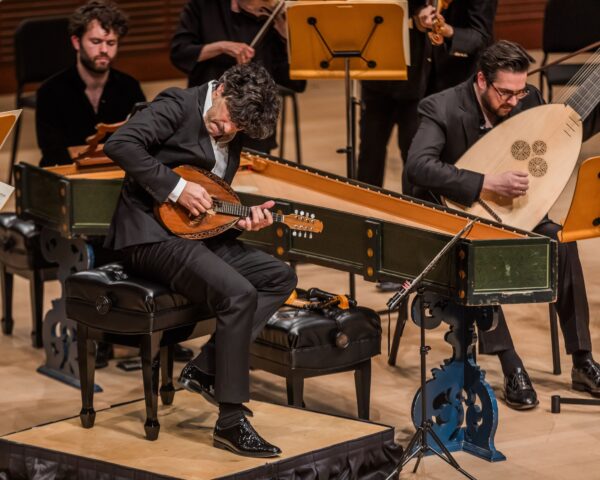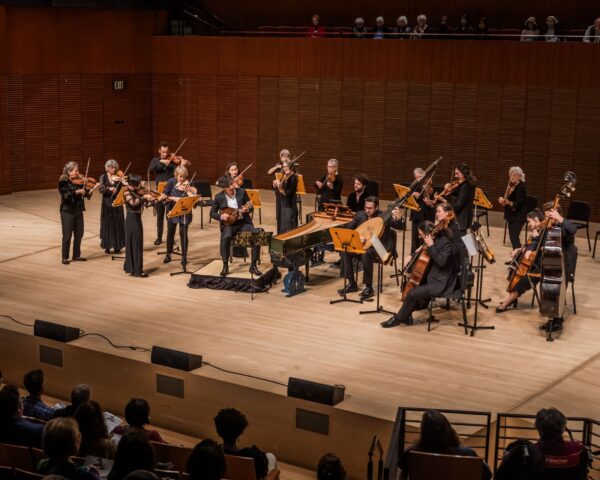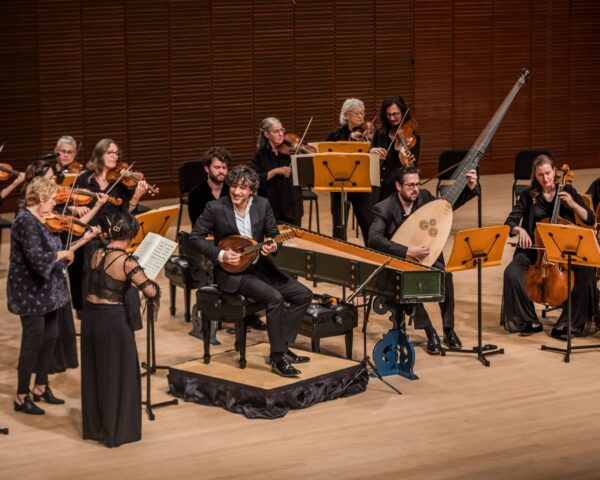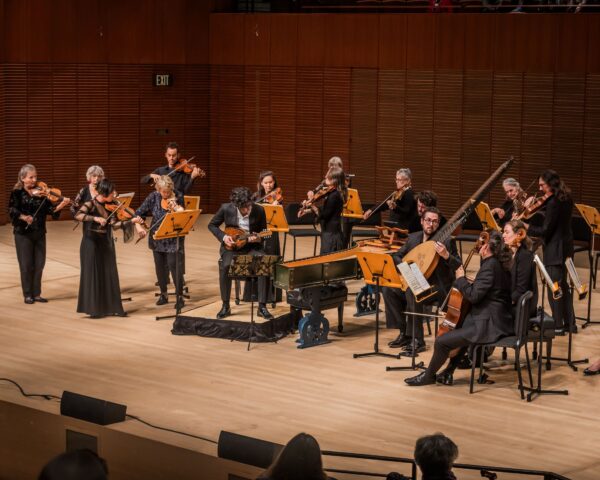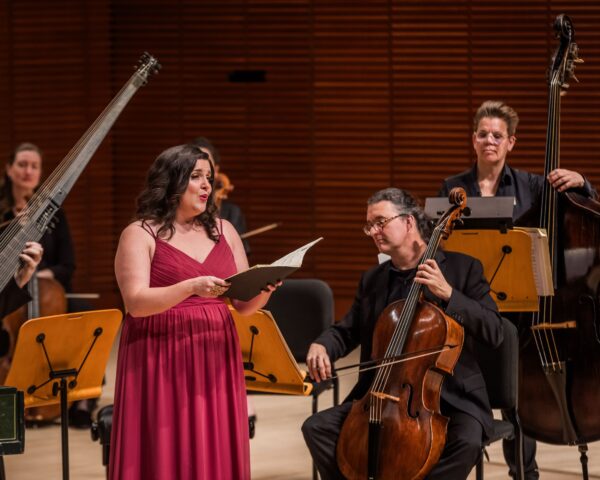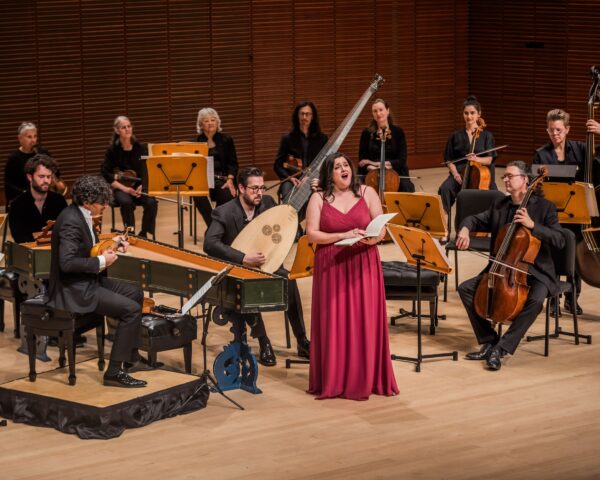BRAVO, AVI!
As part of a SoCal tour, Israeli Mandolinist Avi Avital and San Francisco’s Philharmonia Baroque Orchestra stopped at at Soka University Concert Hall on Sunday, Nove 10, 2024. The concert’s main feature was Vivaldi’s Four Seasons, with the solo violin part transcribed to Mandolin by Avital himself. The program repeats tomorrow night Nov 12 at The Granada Theatre in Santa Barbara, and Nov 13 at The Soraya in Northridge.
Avital’s performance of The Four Seasons by Antonio Vivaldi is nothing short of extraordinary, bringing a fresh, innovative interpretation to a timeless masterpiece that has captivated audiences for centuries. Avi Avital, a virtuoso mandolinist known for his passionate and technically brilliant performances, takes on Vivaldi’s iconic work, originally written for violin, with a spirit that is both reverent to the Baroque origins and boldly original in its reimagining.
From the opening notes of “Spring”, Avital’s approach is unmistakably distinct. The mandolin, with its sharp, delicate resonance, gives the familiar melodies a shimmering, almost ethereal quality. In Avital’s hands, the mandolin achieves surprising dynamism and depth, weaving an intimate soundscape that seems to transport the listener to a sunlit meadow filled with blooming flowers. Avital’s impeccable technique and delicate touch allow for a rich articulation of each note, capturing the playful energy and gentle optimism of Vivaldi’s composition. The famous trills and runs come alive with Avital’s unique phrasing, reflecting the sounds of birds chirping and streams flowing, a subtle yet profound shift from the traditional violin interpretation.
As “Summer” begins, Avital’s mandolin takes on a darker, more intense tone. His ability to evoke the stormy intensity of a summer tempest with a lighter instrument is impressive. The tension in his playing builds gradually, and as the “storm” section of the piece erupts, Avital brings a fierce energy to his mandolin that rivals the drama of any violin rendition. His technical prowess is fully on display here, navigating rapid-fire passages with a fluidity and precision that astound. At the same time, Avital remains deeply expressive, infusing each note with a sense of longing and suspense, capturing the oppressive heat and sudden, thunderous release of a summer storm. The mandolin’s timbre, slightly muted compared to the violin, lends an extra layer of mystery and intrigue to the interpretation, drawing listeners into a uniquely introspective experience.
Moving into “Autumn”, Avital shifts gears, bringing out the festive and joyful tones of harvest season. This movement, often celebratory and warm, feels particularly intimate when rendered on the mandolin. Avital seems to revel in the dance-like rhythm of the piece, his playing full of warmth and exuberance. There’s a rustic quality to his interpretation, reminiscent of folk music traditions, which feels particularly suited to a piece celebrating the bounty of the earth. Avital’s sensitivity to the tonal possibilities of his instrument is striking here; he manages to convey both the carefree spirit of the harvest and a sense of underlying melancholy, a reminder of the seasonal cycle’s inevitable progression. His interpretation of the solo sections is personal and nuanced, breathing new life into a piece so often performed yet rarely with such distinctive character.
Finally, as “Winter” approaches, Avital’s mandolin takes on an icy, brittle clarity. The precision of his playing, combined with the mandolin’s sharper timbre, conveys the chill of the season with haunting beauty. Avital seems to savor each note, allowing the crisp sound to hang in the air, evoking a snowy landscape. His phrasing in the more contemplative sections is introspective and almost meditative, providing a stark contrast to the fiery intensity of the faster passages. The “icy winds” of Vivaldi’s winter are brought to life through Avital’s agile, almost frenetic playing, yet he maintains complete control, never allowing the rapid passages to become chaotic. Instead, there is a fierce clarity to his interpretation, as though the mandolin itself is embodying the biting cold of winter. Avital’s interpretation here is deeply emotional, capturing both the harshness and quiet beauty of the season.
Throughout the entire performance, Avital demonstrates a profound understanding of Vivaldi’s work, while fearlessly infusing it with his unique perspective. His technical mastery over the mandolin is evident in every movement, yet it’s his interpretive choices that truly set this performance apart. By translating The Four Seasons to the mandolin, Avital challenges the listener to hear familiar passages in a new way, to experience the story of the seasons through a different sonic lens. His rendition is, in essence, a dialogue between tradition and innovation, between the Baroque aesthetic and contemporary musical sensibilities.
Yes, Avital’s The Four Seasons offers a refreshing, almost transformative listening experience, but his interpretation does not merely replicate the familiar; it invites us to rediscover it, to appreciate the timelessness of Vivaldi’s music through the lens of a modern artist unafraid to push boundaries. The result is a performance that is both intellectually stimulating and emotionally resonant, a rare combination that speaks to Avital’s talent and vision as a musician. For anyone familiar with Vivaldi’s work, this interpretation offers a new appreciation of its nuances, and for those hearing it for the first time, Avital’s Four Seasons is likely to be a memorable and deeply moving experience.
The Philharmonia Baroque orchestra played at a high level, although not quite reaching the sonic heavenly sounds of the top European and British period-instrument orchestras.
In addition to Four Seasons, soprano Estelí Gomez, sang traditional 18th-century Gondolier songs accompanied by Avital on Venetian (small) Mandolin with a combo of a cello, bass, and theorbo (a lute with a long neck extension). These folk songs were quite lovely and showed the influence of Vivaldi and other Baroque composers (the Gondoliers having had free admission to all concerts), She also sang the aria “Lo Seguitai Felice” from Vivaldi’s L’Olimpiade. Gomez showed a clear bell-like soprano but her dramatic interpretation was limited by her relying on a score in hand for all her songs.
The orchestra also played the Concerto in G minor for Strings and Basso Continuo, RV 156 which didn’t include Avital. Their rendition was very good, but not quite at the level of the Italian Baroque ensembles Concerto Italiano and Academia Bizantina, who have recorded it to great acclaim.
Quibbles aside, this was a remarkable concert, though one can only hope that the next time Avital returns, it will be alongside a Baroque ensemble that fully rises to the level of his exceptional artistry.
photos by Pablo Cabrera
Venetian Splendor
Vivaldi Four Seasons & Gondola Songs
So Cal Tour, Nov 10-13, 2024
Philharmonia Baroque Orchestra
Avi Avital, mandolin and leader
Estelí Gomez, soprano
Concerto in G minor for Strings and Basso Continuo, RV 156
The Four Seasons
Aria “Lo seguitai felice” from L’Olimpiade
Traditional songs from Venice
for more info, visit Philharmonia Baroque Orchestra
PROGRAM:
VIVALDI: Concerto in G minor for Strings and Basso Continuo, RV 156
Venetian Traditional: Si’, la gondola avere, no crie
Venetian Traditional: L’occasion delle mie pene
VIVALDI: Concerto Op. 8, No. 1 in E major, RV 269, “Spring”
Venetian Traditional: In fin che ‘l tempo è bello
Venetian Traditional: Semplicetta è la farfalle
VIVALDI: Concerto Op. 8, No. 2 in G minor, RV 315, “Summer”
VIVALDI: Aria from L’Olimpiade: Lo seguitai felice
VIVALDI: Concerto Op. 8, No. 3 in F major, RV 293, “Autumn”
Venetian Traditional: Chi no gha la borsa grossa
Venetian Traditional: Co’ Checca, Betta e Catte
VIVALDI: Concerto Op. 8, No. 4 in F minor, RV 297, “Winter”

